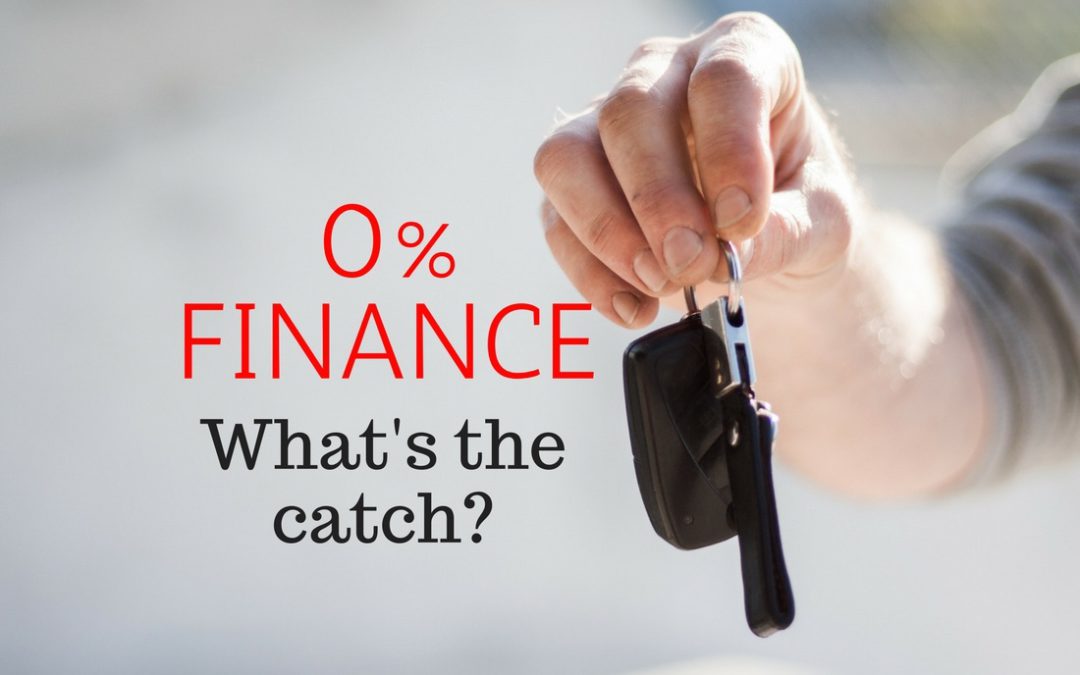
24 Aug 2018 | Business Finance, Personal Finance
Seen an offer along the lines of: ‘Drive away, 0% finance to pay’? Well, like most things in life, when it sounds too good to be true, it probably is.
Finance offers like 0% (or other low interest rates) for new cars exist for a reason: the seller wants you to put the pedal to the metal when it comes to making the purchase.
The truth is, however, that they can actually end up costing you more overall compared to getting your own finance through a broker.
But first: what is a 0% finance deal?
So, you’ve most likely taken out a loan from a bank, or used a credit card before, right?
Well, when you do so, you agree to pay that money back, plus any interest that’s accrued over the course of the loan.
But for 0% loans, you pay no interest.
That’s because instead of paying back a bank or a lender, you’ll likely be paying back the actual automaker.
So how do they make money?
Well, besides the fact they’re selling you a car, they routinely sell the car to you at a higher price than you’d be able to purchase it upfront for.
For example, a car that has a price tag of $24,990 with a 0% finance deal might sound great, but the automaker would most likely be willing to sell it to you upfront for $19,990.
There may also be hidden charges and establishment fees that you might not find out about until it’s time to pay them.
And in many cases you might need a very good credit rating, or a very large deposit, to secure the deal in the first place.
So how can I get a better deal?
The role of a broker is not only to get you a great loan with a very low rate, but to negotiate on your behalf to ensure you pay the best possible price for the vehicle.
Let’s do a little comparison. Say you take out a $20,000 loan with the help of a broker for that $19,990 vehicle mentioned above.
With the right finance, over five years you can pay anywhere between $23,000 and $24,000. That’s going to leave you more than $1,000 better off than it would have if you opted for the 0% finance option.
Another bonus is that by going through a broker, you’ll be made aware of all the relevant fees and charges that may be hidden in the fine print. This means there’ll be no extra costs sneaking up on you.
Final word
If you’re keen to put yourself in the driver’s seat when it comes to purchasing a new vehicle, give us a call.
We’ll make sure that when you drive-away, you’ll know exactly how much you need to pay. Not to mention just how much you saved in the process.
![Negotiating a settlement period]()
10 Aug 2018 | Home Loans

In a perfect world you select a property to buy, complete with white picket fence, and the settlement goes through on the agreed date without a hitch. But as we all know, we don’t live in a perfect world.
When you buy or sell a property you go through a ‘settlement period’, which is the time designated for the buyer to complete payment of the contract before becoming the owner of the home.
Up until the settlement goes through the home is the property of the existing owner.
And with a large home deposit at stake, you’ll want to ensure you choose the right period length.
How much time should I give myself?
Generally, settlement periods fall in the range of 30 to 90 days.
In QLD a 4-6 week settlement period is the most common, but in most other places around the country it’s 60 days.
Just because it’s common, however, doesn’t mean it’s the best fit for your situation (or the seller’s).
You see, both the buyer and the seller must agree on the settlement period.
However, you may have competing motivations, so this can be tricky.
Whatever the case, just make sure you allow yourself enough time for conveyancing, bank financing approval, organising the move, undertaking requested repairs for the buyer, and negotiating settlements for your other property interests.
Also, keep in mind that if you buy the property at an auction, there will already be a settlement date indicated in the contract.
If you can’t meet that date, chat to the selling agent before signing on the dotted line to see if another date is agreeable.
You might push for a longer settlement period if:
– If you’re the seller and you’re still looking for a property to purchase
– If you’re a buyer and you haven’t yet sold your own home
– You’re selling and the buyer has requested you repair something
– If you have an upcoming event that you want deal with first (wedding, big overseas trip, etc)
– Someone is going guarantor on the loan or you’re purchasing through a family trust
– You’re buying off the plan, as the scheme has to be registered with the titles office
– You need to save more money as a buffer (especially if you’re upgrading or will be renovating).
You might push for a shorter settlement period when:
– You’re a seller who has already found another home
– You’re a buyer who has already sold your current home and needs to move quickly
– A holiday period or big event is coming up and you’re keen to move in beforehand
– You’d like to undertake work on the property sooner rather than later
– You need cash flow.
It’s important to get right
One-in-five property settlements in Australia are delayed by about one week so it’s important to give yourself a comfortable buffer.
While each party can request a settlement extension if a delay occurs, that doesn’t mean the other party has to agree.
This is where it gets a little tricky. Each state and territory has different laws, and every contract differs.
Queensland’s laws are probably the most stringent. For example, either the buyer or the seller can terminate the contract, sue for damages, and keep/lose their deposit if the other party is not ready to buy on time.
Other states have a little bit more leeway.
In NSW and Tasmania an extra 14 days can be given, in WA and SA buyers are given three days’ grace before penalty interest applies, and in Victoria a seller can immediately start charging a tardy buyer penalty interest.
Final word
So that’s negotiating a settlement period in a nutshell.
The best news? That’s about as much negotiating as you’ll need to do. Because when it comes to negotiating a loan with a lender, we’ve got you covered.
If you’d like to find out more about our services, get in touch, we’d love to help you out.


